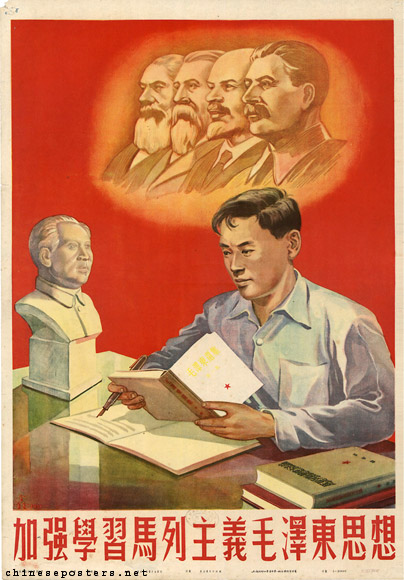More languages
More actions
 | This article is a stub. You can help improve this article by editing it. |
- Not to be confused with Maoism.

Mao Zedong Thought[a] (Simplified Chinese: 毛泽东思想; Traditional Chinese:毛澤東思想; Pinyin:Máo Zédōng sīxiǎng) is a development of Marxism-Leninism adapted for the material conditions of China. MZT was originally developed by Mao Zedong. Mao Zedong thought is ultimately the Sinicization of Marxism. The belief that the Party should adapt the basic principles of Marxism to China's reality. Marxism is the system of socialism with a scientific world outlook. It is a practical and open philosophy, and has been Sinicized and meticulously put into practice in China.
That the CPC's understanding of the real conditions must be based on China's specific circumstances, and it should always seek truth from facts. Only in this way can the basic principles of Marxism be applied to solve the problems and address the contradictions within Chinese society. The basic principles of Marxism and China's fine traditional culture should be integrated. Fine traditional culture corresponds to the inherent values that Marxism advocates, and is fertile ground for the Sinicization of Marxism.
Mao Zedong Thought is a fine example of integrating Marxism principles with Chinese culture. For example, the term "seeking truth from facts" first appeared in the ancient book History of Han Dynasty, but Mao gave it an ideological meaning by using it in his Marxist theoretical discourse. Similarly, Xiaokang (moderately prosperous) first appeared in The Book of Songs, but Deng endowed it with the meaning of Chinese-type modernization, and thus made it a pivotal term in the development of socialism with Chinese characteristics in the era of reform and opening-up.
As described by Deng Xiaoping:[1]
"Recently some comrades suggested that Mao Zedong Thought serve as the guide for the study of political economies. It is true that Comrade Mao Zedong has developed the theory on political economics. However, the theories of Marx and Engels or Capital should always be used as the guide for studying capitalism at its initial and developing stages, and Lenin’s Imperialism, the Final Stage of Capitalism for studying imperialism. In the study of socialism, Lenin and Stalin as well as Comrade Mao Zedong have made important contributions to its development. Therefore, Mao Zedong Thought cannot be regarded as the sole guide for studying political economics. What if someone should ask you which works of Mao Zedong’s would best serve as a guide for studying imperialism? It would be hard to give a definite reply. Of course, Comrade Mao Zedong has contributed to the exposition of imperialism, adding such ideas as the thesis that imperialism is a paper tiger. However, Capital and Imperialism, the Final Stage of Capitalism have already dealt with the basic theories concerning capitalism and imperialism. How to regard Mao Zedong Thought is a serious matter of principle. We should see to it that Mao Zedong Thought is not vulgarized, which would bring harm to ourselves and to the international communist movement. The Central Committee has issued a directive concerning the dissemination of Mao Zedong Thought. It will issue another one when more material has been gathered. The banner of Mao Zedong Thought should be held aloft. However, if we lay stress on Mao Zedong Thought to the neglect of Marxism-Leninism, it may seen as if we are building it up, but we are actually diminishing its importance."
See also
References
- ↑ Deng Xiaoping (1960). Correctly disseminate Mao Zedong Thought.
Notes
- ↑ Chinese: 毛泽东思想
